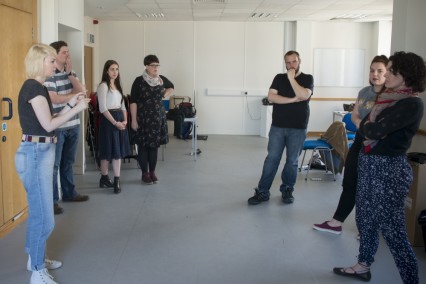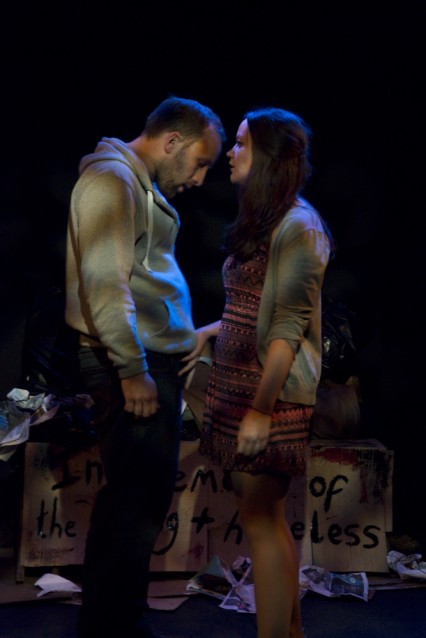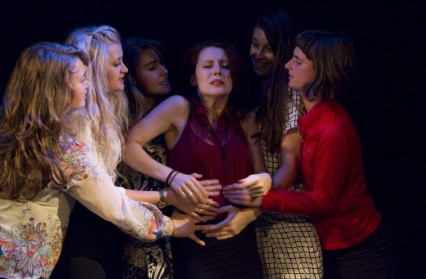The Other Room @Porters, Cardiff
With an opening programme featuring uncompromising plays by Sarah Kane and Howard Barker, and a new bilingual drama from Welsh playwright Alun Saunders, The Other Room loudly announced itself last spring as a potentially important new home for contemporary Welsh theatre. How did this recent addition to Cardiff’s fringe scene follow its artistically ambitious first season? Lacking the resources of revenue funding, this tiny company might be forgiven for simply heaving a sigh of relief and taking the entire summer to congratulate itself on survival. Instead it opted to mount a week-long Young Artist’s Festival, during which forty young actors, writers, stage managers and directors attended workshops and masterclasses, and then formed five mini-companies to stage public performances of 10-minute plays commissioned from leading Welsh or Wales-based playwrights.

Artistic Director Kate Wasserberg makes clear that in hosting a Young Artist’s Festival less than six months after opening, The Other Room was signalling its intent to become a venue where young theatre practitioners could start their careers: ‘My first show was at a pub theatre and it was an incredible learning experience, so we tried to give the participants a bit of that. It occurred to us that we should play a role in helping young artists to meet each other and perhaps form companies of their own’.
Participants of the festival were school-leavers, undergraduates or recent graduates; ranging in experience and training, but all at that crucial point in their lives where a career in theatre appears to be an exciting though perhaps unrealisable possibility. The first two days of the festival were taken up with talks on subjects such as ‘finding an agent’ to a session on fundraising given by The Other Room Executive Director Bizzy Day. ‘The idea is to pass on as much as possible of what we have learned in the last year, in setting up The Other Room,’ Wasserberg explains; ‘We want the festival to be much more than a showcase, we want it to be a genuinely valuable learning experience that helps to equip artists to make their own work’.
Writers attended a masterclass by BBC Wales radio drama producer Helen Perry, who gave sage advice on the importance of structuring narrative around the journey of a hero central to the story. During a packed and absorbing two-and-a-half hours, Perry discussed the development of character arcs using a number of illuminating examples from Groundhog Day to Home Alone and Gary Owen’s recent hit Iphigenia in Splott. An acting masterclass by Suzanne Packer, star of BBC’s Casualty, centred on developing performance from observations of people in everyday life, but concluded with some pragmatic recommendations on how to succeed as a professional actor.
Pep-talks and lessons in narrative theory are of real help to a young artist, however, they are no substitute for the development of craft in front a live, paying audience. Happily, all three nights of the Young Artist Festival were sold out. The proceeds of box office takings were later distributed among participants on a profit-share basis, to partially defray the costs of the fee they had each paid. The festival was entirely self-funded on that basis. In terms of receiving feedback from an attentive audience and learning from experienced practitioners and fellow artists, the rewards of participation for the young artists was significant, as this blog from actress Lizzie Fitzpatrick illustrates.

The five mini-companies of festival participants had only a few days to rehearse a short play by an award-winning dramatist such as Kelly Jones, Tracy Harris, Neil Bebber and Matt Hartley. The results were very impressive given this time-frame. What was striking about the plays, each an example of skilled stage-writing, was their artistic daring. Of particular note was I Feel Sexy All the Time, a challenging piece by Tim Price in which almost all of the dialogue consisted of the play’s title repeated over and again with varying sub-textual inflections. Whereas so many ‘yoof’ plays seem to be about disaffected and inarticulate glue-sniffers, the contributors to the Young Artist’s Festival had provided plays (for a nominal fee) that challenged both theatrical form and the abilities of their inexperienced casts. Price’s I Feel Sexy All The Time made a number of demands on its entirely female cast, with the dialogue shifting frequently from soundscape to conversation, with every repetition presenting the danger of the whole thing dissolving into meaningless babble. Novice director Natalie Paisey handled the action with admirable clarity and purpose, getting the very best from a group of talented actors, who evidently understood that effective ensemble work results from listening intently to your fellow actors and from a generous impulse to serve the play rather than ego.
If Wales is to build on the recent achievements of its burgeoning theatre scene, which has grown exponentially over the past decade – due in part to the founding of National Theatre Wales – time, space, guidance and money must be invested in our young artists. The Other Room has ambitions to continue its recent efforts. ‘I’d like to see the festival become an annual event, and for it to produce theatre-makers of the future,’ says Wasserberg. ‘It’s been a crazy scramble of a week full of innovation, comradeship and courage. It has been inspiring to meet so many people who share our passion for making work. I am very proud to have spent this week with them and can’t wait to see what they do next.’ Wales Arts Review hopes that The Other Room is sufficiently supported so that the Young Artists Festival becomes an annual fixture in the capital’s theatrical calendar.
Header image is from I Feel Sexy All the Time by Tim Price. (Photo credits: Pallasca Photography)












